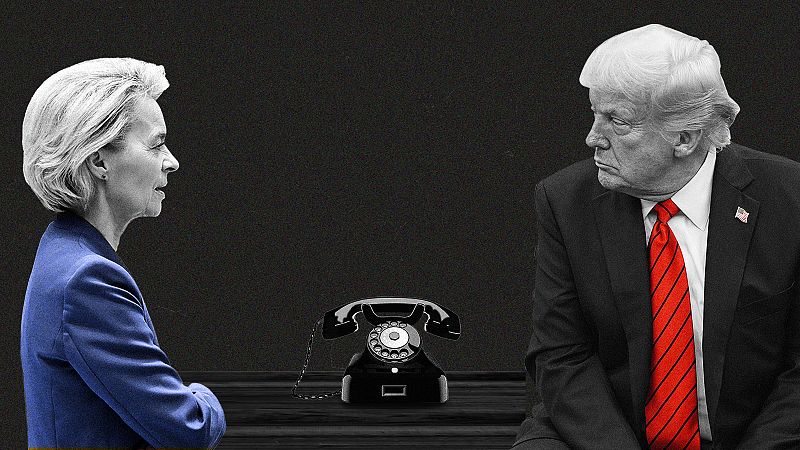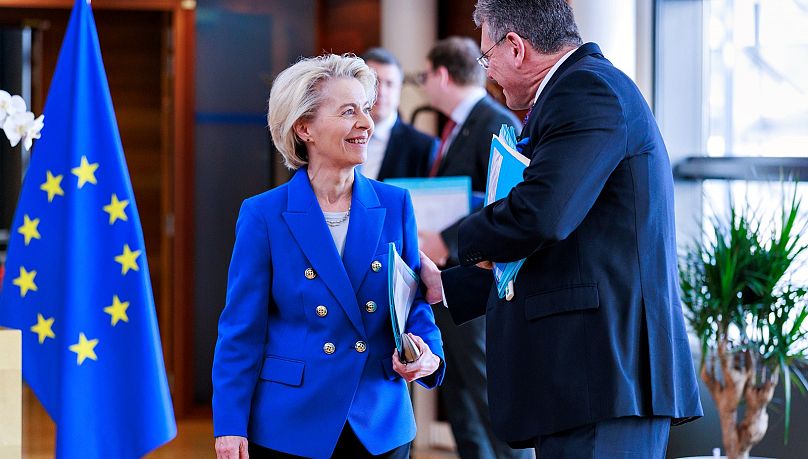
"One hundred percent," is how Donald Trump has estimated the chances of striking a deal between the United States and the European Union, two of the world's largest economies.
"Oh, there'll be a trade deal, 100%," Trump said while receiving Italian Prime Minister Giorgia Meloni. "They want to make one very, very much, and we're going to make a trade deal, I fully expect it. But it'll be a fair deal."
The need for an agreement has become a high priority for both sides, although for different reasons. For the EU, a means to avoid the excruciating pain of the 20% tariff that Trump announced earlier this month, and later paused. For the US, a way of calming the markets, reassuring anxious investors and notching up a PR victory.
The White House has fashioned the 90-day suspension as a make-or-break window of opportunity for other countries to set off on a pilgrimage to Washington DC, seek an audience with the American president and find a compromise. Whether that compromise should be mutually or unilaterally beneficial is yet to be clarified.
Meloni's journey, the first by a European leader since the presentation of the so-called "reciprocal tariffs", marked another chapter in this flurry of diplomatic engagements. The previous day, Trump had met with a trade delegation from Japan.
"Everybody's on my priority list," Trump said.
The Italian premier, who has leveraged her right-wing credentials to position herself as a bridge-builder between the two sides of the Atlantic, echoed the optimism in the room and invited the president on an official visit to Italy.
"I'm sure we can make a deal, and I'm here to help on that," she told reporters.
Meloni then made a pointed clarification that inadvertently or otherwise exposed the limitations of her power.
"I cannot deal in the name of the European Union," she said.
As an EU member state, Italy is part of a large customs union and a single market shared by 26 other nations. The same duties, quotas, preferences and sanctions apply across the common border, making the bloc a unified entity vis-à-vis commercial partners.
In practice, this means that Germany cannot impose a 10% import tariff on a Chevrolet SUV, while Italy charges half that rate for the same product. It also means that Germany cannot agree with Japan to scrap duties on each other's cars, while Italy does the same with the US. All 27 member states are bound by the same rules and the same deals.
The only one who can decide how high and how low tariffs go is the European Commission, afforded exclusive competence to manage the bloc's commercial and customs policy by the founding treaties.
This provision quickly reduces the number of people that Trump can call to negotiate and secure the trade deal he craves to just one name: Ursula von der Leyen. And yet, he has not met or talked with the Commission president since his return to the White House.
Clash of narratives
Trump's dislike of the EU is well documented.
The Republican has repeatedly denounced the bloc as a monopolistic force that, in his view, was formed to "screw" with the US and refuses to purchase American-made goods. His insistence that he loves European countries, as separate nations, only underscores his aversion to the EU as a project of political and economic integration.
"You think of the European Union (as) very friendly. They rip us off. It's so sad to see. It's so pathetic," Trump said when he unveiled his tariffs.
Officials in Brussels have tried to debunk this narrative by pointing to the broader picture: while the EU has a traditional surplus of goods with the US, worth €156.6 billion in 2023, it has a sizable deficit of services, worth €108.6 billion. This reflects a more balanced relationship than that depicted by Washington to justify its punitive tariffs.
Despite the billions at stake, both sides have made little to no progress to avert what could soon become an all-out, havoc-wreaking trade war.
The absence of communication between Trump and von der Leyen has grown increasingly conspicuous and concerning with each passing day.
In the lead-up to his inauguration in January, von der Leyen's team sought to schedule a meeting between the two leaders, but the efforts never yielded results. Transatlantic tensions began rising soon after Trump took office and launched his broadside attacks against Greenland's sovereignty and Ukrainian President Volodymyr Zelenskyy, causing dismay across the bloc and erecting new obstacles in any diplomatic outreach.
Although von der Leyen continues to identify herself as a "great friend" of America and a "convinced Atlanticist" she has significantly hardened her tone in public.
"Europe is still a peace project. We don't have bros or oligarchs making the rules. We don't invade our neighbours, and we don't punish them," she told the Zeit newspaper.
The Trump-von der Leyen silence has created a deep vacuum at the highest political level, leaving extremely sensitive matters in the hands of deputies who lack the mandate to make crucial decisions.
Von der Leyen now relies on Maroš Šefčovič, the European Commissioner for Trade, who is sometimes accompanied by her chief of staff, Bjoern Seibert.
In recent months, Šefčovič has had several calls and meetings with his American counterparts: Howard Lutnick, the US Secretary of Commerce, and Jamieson Greer, the US Trade Representative. Their last joint meeting took place in Washington just a few days after Trump announced the 90-day pause and von der Leyen replied in kind.
The read-out from Šefčovič's trip repeated the EU's offer of a "zero-for-zero" tariff deal on all industrial goods, which Trump previously rejected, and mentioned topics such as semiconductors, pharmaceuticals and global overcapacity in steel and aluminium.
Negotiations will continue at the technical level to "further explore the ground for a mutually advantageous deal", a Commission spokesperson said.

That landing zone appears remote for the time being however.
A source familiar with the talks told Euronews the behind-the-scenes effort is not yielding the desired results and the Commission even fears that the White House could renege on the 90-day window of opportunity opened by Trump's suspension.
The spectre of new tariffs on the pharma sector, which the American president has promised to impose, casts a dark shadow over the against-the-clock mission.
"I think the US got a bit spooked by the impact of pharma tariffs initially as they hadn't evaluated the supply chain issues, but they may not await for the outcome of negotiations," the official said, speaking on condition of anonymity.
When it comes to technology, the Commission fears that America's endgame is to "dismantle the whole digital rulebook" introduced in the previous mandate, notably the Digital Services Act (DSA) and the Digital Markets Act (DMA). Under these laws, the executive has opened a string of probes into Meta, Google, X and Apple that can lead to hefty fines if the companies are found to be in non-compliance.
While Brussels insists the investigations are completely separate from the issue of tariffs, the White House seems to think otherwise. Peter Navarro, a Trump loyalist who serves as senior counsellor for trade and manufacturing, has made a direct link between trade flows and the digital regulations, equating the latter to "lawfare".
The disagreements are so wide – and the narratives so seemingly incompatible – that there is a possibility that Šefčovič, Lutnick and Greer might reach a provisional deal, but that it will then "not hold water and cross the line" because Trump and others in his inner circle will abruptly change their minds, the official cautioned.
Even if von der Leyen were to secure the sought-after phone call – or a face-to-face meeting – Trump's mercurial character risks being an insurmountable hurdle for the seasoned manager of back-to-back crises.
"We're in no rush," Trump said during the Meloni visit, dampening the "100%" chances he had earlier predicted.
When asked if he would meet with von der Leyen, Trump simply said his team had had "numerous talks" with "other countries", without any mention of the Commission chief. He also defended his disruptive policies, declaring: "Tariffs are making us rich."







